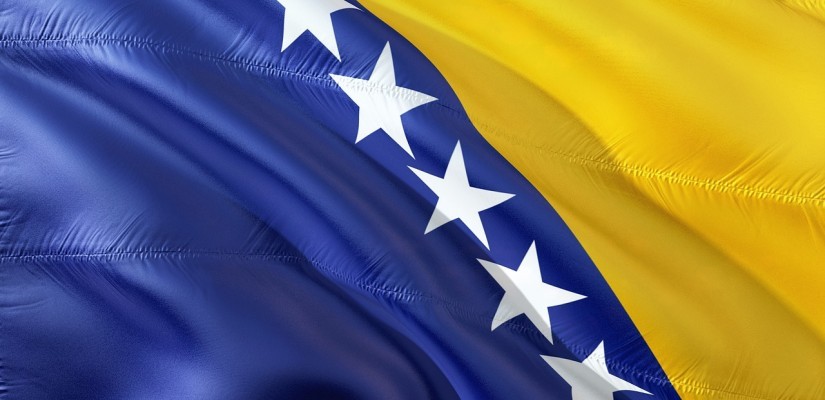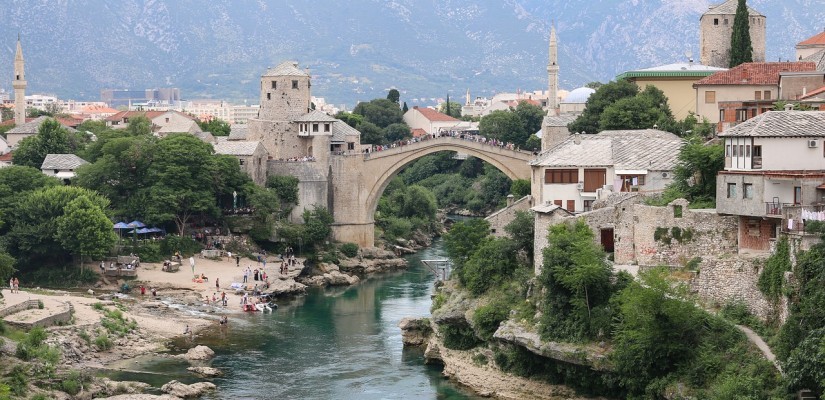The ethnic divisions that once plunged Bosnia-Herzegovina into war during the 1990s now threaten to divide the country once again. On October 7th, 2018, Bosnia held Presidential and Parliamentary elections, the results of which could potentially further divide Bosnia.
Bosnia-Herzegovina is host to one of the most complex government structures in the world. The Dayton Peace Agreement in December of 1995 ended the brutal war in Bosnia and established the political system still in use today. This agreement divided the Bosnian government along ethnic lines, between Bosnian Croats, Bosnian Serbs, and Bosnian Muslims (Bosniaks). The nation consists of two regional mini-states: the Bosnian Serb entity, “Republika Srpska”; and the joint Bosniak-Croat “Federation of Bosnia and Herzegovina.” Both are joined in a central government with a Tripartite presidency that rotates between an elected Bosnian-Serb, Bosnian-Croat, and Bosniak president. In this system, each President represents their constituent ethnic group. Many experts agree that this bizarre political system leaves Bosnia paralyzed by conflicting interests, yet this system was the best option at the time for ending the violent conflict. Unfortunately, this system of government contains preexisting systemic conditions that discourage interethnic cooperation in government and encourage politicians to capitalize on ethnic divisions in order to maintain power. Consequently, Bosnia’s 2018 elections exhibited some political candidates who have exploited the national conversation on ethnic divides for political purposes.

In Bosnia’s election system, each voter casts a ballot for president based on their ethnicity, meaning each president is elected solely by their ethnic constituents. The most divisive candidate to claim victory in this October’s election was Milorad Dodik, a pro-Russian Serb nationalist who campaigned on a plan to secede Republika Srpska from Bosnia. Dodik defeated moderate incumbent Mladen Ivanic to win his seat as the rotating Serb president. Dodik’s victory comes with dismay to his critics, given that this ethnonationalist will be the first rotating president in power. Dodik echoes the mentality of American President Donald Trump by saying that he wants to “put Republika Srpska first.” He has also voiced his opinions of the Bosniak-Croat Federation by depicting Sarajevo - the capital of Bosnia and location of the central government - as “foreign territory.” Furthermore, Dodik has said that he will not go to Sarajevo and only communicate through video conference. Most notably, Dodik plans to hold a referendum on independence for Republika Srpska. He has also said that he will write to President Donald Trump and demand the abolition of the Office of the High Representative - a part of the Dayton Peace Accords designed to protect the country's constitution and hold the two mini-states together.
Dodik was not the only presidential candidate who campaigned on a platform on furthering ethnic divides. Dragan Covic, the Croat incumbent of the right-wing HDZ party, advocated for the creation of a third mini-state entity just for Bosnian Croats. Covic however, was defeated by the moderate Zeljko Komsic. With the Bosniaks electing the EU-friendly Sefik Dzaferovic as their president, Dodik may yet have trouble shifting Republika Srpska away from Bosnia.
Much more than just a selection of Bosnia’s leadership, this election represents a test of Bosnia’s commitment toward joining NATO and the EU. While Bosnia has already taken several steps toward EU accession, the pro-Russian nationalist Dodik has capitalized on ethnic divisions left over from the war, moving Republika Srpska closer to Russia. Dodik maintains close ties with Russian President Vladimir Putin and Foreign Minister Sergei Lavrov. President Putin had firmly supported Dodik throughout his campaign, with the two meeting frequently in the days leading up to the election. It should come as no surprise that increased support for Russia within Republika Srpska coincides with an increase in support for independence from Bosnia-Herzegovina. Russia has denied any interference in Bosnia’s elections, yet Russia has plenty of incentive to prevent another Balkan state from aligning closer to western nations. Thus far, Albania, Croatia, Slovenia, and Montenegro have already joined NATO, with Croatia and Slovenia holding EU membership as well. President Putin is undoubtedly pleased with Bosnia’s increasingly difficult struggle to join the EU and NATO.

The people of Bosnia face many challenges ahead of them. In addition to growing ethnic divisions, Bosnia is notorious for its corrupt politics. One uniting factor that supersedes ethnic lines and unites the people of Bosnia is their shared frustration and distrust in politicians. Most Bosnians do not trust politicians and many feel forgotten by those who are meant to represent them. The promise of jobs in exchange for votes is one example of the rampant corruption facing Bosnia. Two key factors in this October election were low wages and high unemployment, which are causing many young people to leave the country. Many in Bosnia are losing hope for the future. On October 5th of 2018, anti-corruption protesters gathered in large numbers in both Sarajevo and Banja Luka, the capitals of the Bosnian-Croat Federation and Republika Srpska respectively. These demonstrations showed aversion to corruption as a unifying force for the people of Bosnia.
The nation of Bosnia-Herzegovina is at a crossroads in its history. Bosnia could set an example of a post-war multiethnic state, or it could continue to be a fragmenting hub for corrupt politics. The global community should keep a watchful eye on this nation that could be split in two, leaving half to move closer to Russia and the other even farther off from the prospects of EU and NATO membership.
